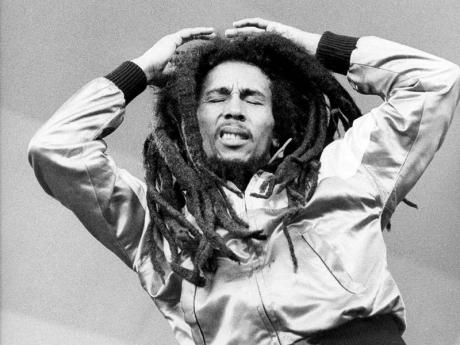Columns By Category
Popular Articles
- THE REALITY OF TACKY AND SAM SHARPE
- PLEASE DON’T BETRAY US AGAIN POLITICIANS
- CRY, MY MURDEROUS COUNTRY
- MODERNIZING THE PNP: VERSION.2020
- IS THE EXCHANGE RATE ON TARGET OR IS IT A WHOPPER?
- CARICOM: BEACON OF DEMOCRACY OR COWARDLY DISGRACE?
- DEMOCRACY PREVAILS IN THE UNITED STATES
- THE CRIME STATISTICS SPEAK FOR THEMSELVES
- PETROJAM, OIL PRICES, AND THE $7 TAX
- Kevin O'Brien Chang | Brains, not brutality – smart(phone) crime fighting
- TERRORISM IN JAMAICA
- STOP CURRENCY CRISIS TALK
- 'CASTIGATED KD' AND THE 9 YEAR WONDER
- GET PAST MERE TALK ON DONS AND GARRISONS
- LOW VOTER TURNOUT MYTHS AND ELECTION PREDICTIONS
- HOW GREAT CAN BROGAD BE?
- PNP WAS SOCIALIST FROM THE START
- AN AGE AND GENDER RE-ALIGNMENT ELECTION?
- Most influential Jamaican of 2010-2019?
- NO GAYLE, NO RUSSELL, NO TALLAWAHS
BOB MARLEY REGGAE SUPERHERO
- 8-2-2012
- Categorized in: 2012 Articles, Ten Greatest Jamaicans, Yearly ARCHIVES

Robert Nesta Marley is the most famous figure this country has produced. (Though Usain Bolt might be usurping him in places like China and India.) Mention Jamaica, and foreigners who scarcely know in which hemisphere the country is located will cry in recognition, "Bob Marley!"
He is increasingly becoming to Jamaica what Robert Burns is to Scotland - most famous son, national bard, and symbol of cultural identity. The parallels between the two great Roberts are uncanny. Both were born to humble circumstances in a small country with a few million inhabitants. Both were free spirits who praised the intoxicating pleasures of ganja and whisky respectively. Both fathered numerous children from multiple mothers - roughly nine from seven for Marley and 11 from six for Burns. Both penned world anthems, with One Love being arguably the closest modern equivalent to Auld Lang Syne. And both died young, Marley at 36 and Burns at 37.
But it's not just music that has made Marley a great international icon. His songs are inseparable from the handsome, dreadlocked, mixed race, almost Christ-like visage that made him a visually ideal global icon. Being obviously not pure, anything meant every race could identify with him, in a way often not possible with someone like, say, Peter Tosh. And in our still western media dominated world, those accepted by Europe and America become famous everywhere. If Bob Marley looked like Peter Tosh and vice versa, whose music would be more popular today? It's an interesting question to ponder.
His remarkable wife Rita certainly played her role.
"I had so much faith in him. And this was why Bob remains, I think, so successful. Sometimes I hate to say it. If there wasn't a force. But it's a fact. Cause, look at Peter and other singers who have been forgotten. Even Chris. When I say 'Chris, let us do a Legend tour and so' Chris said 'Take it easy'. And I said 'No, I am going to'. And me and the Wailers and I-Threes put together this Legend tour and bring Bob live on stage on film. So instead of just put it in a cupboard, you realise this legacy is living."
Then there is the martyr factor. In our image-driven age, as the stand-up comics joke, dying young is a great career move. Most dominant twentieth century icons - James Dean, Marilyn Monroe, Elvis Presley, Che Guevara, Princess Diana for instance - died before 40, or in John F. Kennedy's case looked it.
While their surviving contemporaries slowly dwindled into aged mortality, they in the public mind stayed forever young and glamorous. Watching Bunny Wailer in concert a few years back, some observers wondered how audiences would have reacted to a similarly grey and grizzled 60-odd year-old Bob Marley.
Glory is a cold sun that warms no bones. But in the minds of the living, the early dead remain perpetually young and immune to the ravages of age - untarnished blank canvases on which we paint our dreams of the ideal. Marlon Brando was a better actor than James Dean, Eisenhower a greater leader than Kennedy, and Johnny Cash a superior artiste to Elvis Presley. But in the popular mind, the accomplishments of fat old Marlon, bald Dwight, and wrinkled Johnny just can't compete with handsome, sleek, airbrushed Jimmy, JFK and Elvis.
None of this brings Marley's greatness into question, although some fervent admirers get carried away. The man was a singer and songwriter - who, like all musicians, produced the occasional lousy tune - not some latter day Biblical prophet. He certainly never professed such a role for himself.
International symbol
This has not stopped him from becoming a posthumous international symbol of resistance against oppression. Guerilla fighters in all corners of the globe have testified to the inspiration they derived from Bob's songs of freedom. It's almost impossible now to imagine any march against injustice anywhere unaccompanied by strains of 'Get up stand up, stand up for your rights' and 'Emancipate yourself from mental slavery, none but ourselves can free our mind'.
Without doubt one of the 20th century's finest musicians, Marley's almost unparalleled global popularity seems to encompass all humanity. Americans, Africans, Arabs, Asians, Europeans, men, women, the young, the old, the middle aged - everyone seems to like Bob Marley's music. And his lustre simply keeps growing. In 2000 Time Magazine chose 'Exodus' as album of the century, and the BBC named One Love song of the century. It's hard to top that for lasting global appeal.
Kevin O'Brien Chang is author of Jamaica Fi Real: Beauty, Vibes and Culture, and managing director of Fontana Pharmacy. Kobchang365@gmail.com www.kevinobrienchang.com
